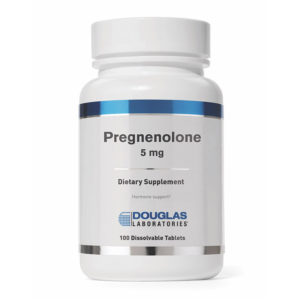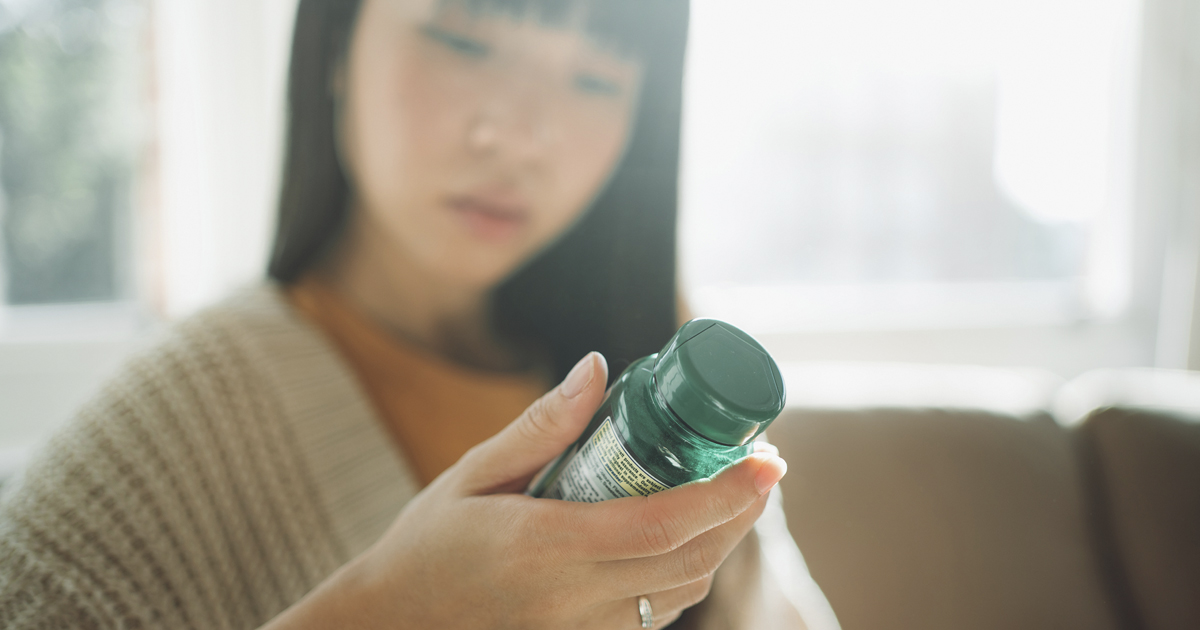
A Guide to Vitamins and Supplements for Women
Photo from Getty Images
Originally Posted On: https://compoundingrxusa.com/blog/women-vitamins-supplements/
Eating a well-balanced, healthy diet is the best way to meet your nutritional needs. However, even with good diet practices, sometimes these needs are still not met. Multivitamins have long been used to help supplement the crucial vitamin and nutrient needs of women at all stages of life.
In fact, women need specific vitamins to keep their bodies healthy, protect developing babies, and protect them from diseases and conditions that can impact them later in life. Ongoing research continues to reveal which vitamin supplements are necessary, beneficial, and only useful during pregnancy, disease, or deficiency circumstances. In general, however, many women have experienced beneficial results by introducing vitamin supplements to their daily routine.
Female Vitamin Categories
In general, vitamins are divided into two distinct categories: water-soluble and fat-soluble. Water-soluble vitamins can only be dissolved in water and are not readily stored in your body. As a result, these vitamins need to be supplied continuously throughout your life and in many sources within your diet.[1] Water-soluble vitamins consist of eight B vitamins including B1, B2, B3, B5, B6, B7, B9, and B12, as well as vitamin C. The group of B vitamins are best known for their role in energy production, while vitamin C is often associated with immune health and function. [2] By contrast, fat-soluble can be dissolved and stored within fats, or lipids. Fat-soluble vitamins are stored in your body’s tissue, allowing them to remain in your system longer. Fat-soluble vitamins include vitamin A, vitamin K, vitamin E, and vitamin D.
How much you need of each of these vitamins to maintain a healthy balance varies with age as well as health status. Deficiencies tend to be more common during specific life stages, such as pregnancy or advanced age. Vitamin needs can also depend on a variety of other circumstances, including excessive drinking or smoking, or a medical condition that impacts your ability to absorb vitamins. Moreover, supplements may enhance functioning, such as focus and attention.
Are Women’s Multivitamins Good for You?
 Photo from Getty Images
Photo from Getty Images
With all the vitamins and supplements on the market, it is natural to wonder, “Do women’s multivitamins work?” Research often provides conflicting feedback, and responses can change drastically as you search for answers online. However, vitamins for women are often beneficial, especially for those experiencing vitamin deficiencies and those at specific stages of life. What’s important to understand is multivitamins and individual vitamins are best used to avoid, target, and eliminate vitamin deficiencies commonly found in women. These vitamins can also target the vitamin needs unique to certain age ranges and lifestyles.
Children and Teenagers
Girls between the ages of 9-13 don’t require the same amount of vitamins as older teenagers and women. In general, older children and tweens’ vitamin requirements can usually be met easily with a healthy diet. However, teens over 14 have vitamin needs similar to that of adult women. Recent research has indicated that teenage girls are more likely to become deficient in some nutrients, compared to the general population. [3]
Women Between the Ages of 19-50
The same study demonstrated that women between these ages are more likely than the general population to be deficient in several different vitamins. Most commonly, adult, premenopausal women experience deficiencies in vitamin D and B6. The necessity of vitamin supplements can vary depending on a woman’s medical circumstances and lifestyle habits. Healthy women who maintain a regular routine of healthy eating and physical activity may not need the additional support of a multivitamin. However, for women with medical conditions, diets that eliminate certain foods, those who smoke or drink excessively, or those who are obese, multivitamins can play a significant role in combating vitamin deficiencies.
Women Who Are Pregnant or Breastfeeding
Nutritional needs change and vitamin needs increase when a woman is pregnant to support fetal and maternal health.[4] If a woman is pregnant or could become pregnant, it is crucial to consume adequate folic acid to prevent certain birth defects. As a result, the Center for Disease Control and Prevention recommends that all women of reproductive age get 400 micrograms of folic acid daily. [5] The amount of iron and vitamin D found in a women’s multivitamin can also be beneficial for both women who are pregnant or could become pregnant.
Women 50+
As we age, it gets harder to maintain the vitamin levels we need through dietary intake alone. Certain medications can also reduce vitamin levels in the body, leading to undesired deficiencies. In particular, women lose bone density faster than men due to hormonal changes, and many women don’t get enough calcium and vitamin D from their diets, which is essential in helping bone health. In this way, postmenopausal women can especially benefit from a women’s multivitamin to help prevent osteoporosis. [6]
Vegetarians
Selective diets can also impact a woman’s ability to get the vitamins they need through their food. This is especially apparent in vegetarian and vegan diets because some vitamins necessary for humans are more prevalent in animal products than plant products. A great example is B12, which is not found in plants. Vegans may not get enough B2, B12, or vitamin D from food alone. A multivitamin supplement can help provide the vitamins that either aren’t present or aren’t sufficient in their diet.
Additional Considerations
Multivitamins can be a great option for women who fall under several specific categories. This includes women who are obese or women that have had bariatric surgery in the past. [7] In many circumstances, these women’s bodies are incapable of absorbing the amount of vitamins they need. Other populations with difficulty absorbing vitamins include women who drink or smoke heavily, women with Type 2 Diabetes, women with autoimmune diseases, and women with gastrointestinal conditions.
Which Vitamins and Supplements do Women Need?
 Photo from Getty Images
Photo from Getty Images
The vitamin needs of women are similar to those of men. However, there are several exceptions, especially when it comes to iron, calcium, and folate acid. When determining whether a multivitamin or vitamin-specific supplement is best for you, it is helpful to understand women’s unique needs. These vitamins are most often associated with women’s health.
B-Vitamins
B-vitamins are essential for a healthy system. [8] There are several different B-Vitamins that your body needs. Most fall under the category of water-soluble, meaning that you have to actively replace these vitamins to avoid a deficiency that could impact your health.
Important B-Vitamins include:
- B1 (Thiamine): This vitamin helps convert nutrients into energy and promotes healthy cellular function.
- B2 (Riboflavin): This vitamin supports healthy energy production and growth development. It also functions as an antioxidant.
- B3 (Niacin): This vitamin is crucial to healthy nervous system function as well as for energy production.
- B6 (Pyridoxine): This vitamin is important for macronutrient metabolism function, immune function, and neurotransmitter production.
- B9 (Folate): This vitamin aids in the production of DNA, RNA, red blood cells, proteins, and neurotransmitters.
- B12: This vitamin is essential to neurological function, as well as red blood cell and DNA production. It keeps the body’s nerves and blood cells healthy.
Antioxidants
Vitamins such as vitamin A, vitamin C, and vitamin E all play an important role in protecting your body against free radicals that can damage the cells within your body. These antioxidants can help lower the risks of certain health problems caused by early cell death and may also slow aging. Antioxidants can also help to boost your immune system.
Vitamin D
This vitamin actually works as a hormone. It moves calcium and phosphorus into your bloodstream. [9] When your body doesn’t have enough Vitamin D, it will start to take calcium and phosphorus from your bones. This can thin your bones over time, which can lead to a serious condition known as osteoporosis.
Vitamin K
Vitamin K is another essential vitamin that helps keep bones strong as we age. It can also aid in blood clot prevention, which is important for both individuals who are post-surgery and those who are aging. [10]
Common Ingredients in Women’s Multivitamins
When it comes to choosing the right multivitamin, the options can seem endless. It can feel overwhelming to search the shelves of a local store and make sense of all the different ingredients and recommended dosages. In addition, since multivitamin supplements aren’t regulated by the FDA, ingredients and doses can vary. In general, however, most women’s multivitamins address certain nutrients in which women are often deficient.
Common women’s multivitamin ingredients include:
- Vitamin A
- B Vitamins
- Vitamin C
- Vitamin E
- Calcium
- Iron
- Magnesium
- Thiamin
- Potassium
- Niacin
- Folate
- Biotin
What Is a Good Female Multivitamin?
When it comes to finding a good multivitamin for women, there are several different factors you’ll want to consider. First, it is important to understand that there is no one “best” all-around multivitamin on the market. Multivitamins are meant to supplement areas where your own personal nutritional needs may be lacking. This means you’ll want to start by considering your current lifestyle, diet, and medical needs.
Are you eating a balanced diet, or are you lacking in certain areas that may necessitate vitamin supplements? For example, if you’re a vegan, you may want to supplement vitamins often received through eating meat. You’ll also want to consider whether smoking, drinking, bariatric surgery, or a medical problem like diabetes or gastrointestinal disease is interfering with your ability to absorb vitamins and maintain vitamin levels.
Finally, you’ll also want to consider the stage of life you are currently in.
Most multivitamins come in a range of options including:
- Teen
- 18+
- 50+
- Prenatal
- Postnatal
Understanding what needs supplementation and how your lifestyle and age change your vitamin requirements can help you determine which multivitamin would be best for you.
Do Women’s Multivitamins Cause Weight Gain?
One common concern is whether multivitamins can cause weight gain. To put it simply, vitamins themselves can’t cause weight gain. In fact, women may experience weight gain due to vitamin deficiencies their body is experiencing. For example, vitamin D deficiency and vitamin B12 deficiencies may lead to weight gain.
Weight gain may also be unfairly associated with multivitamin use when a deficiency results in a loss of appetite. In short, you may be losing weight unhealthily because you aren’t getting the vitamins you need to support a healthy lifestyle, known as malnourishment. When you return to health with multivitamin use, your appetite could increase. This is where maintaining a healthy lifestyle becomes important to offset any unwanted weight gain.
What Should a Woman Take for Daily Vitamins?
The National Institute of Health publishes recommended dietary allowances for most nutrients. [11] In general, it is recommended that women take daily vitamins that provide folic acid, especially for women who are pregnant or who might be considering pregnancy in the future. B12 is also highly recommended because it keeps the body’s nerves and blood cells healthy, and the National Institute of Health recommends 2.4 mcg daily. It is also recommended that women get at least 15 mcg of vitamin D daily. Calcium intake should be between 1,000-1,300 mg depending on age. Iron is also another important factor for women’s health, and many women experience iron deficiency.
Featured Vitamins and Supplements for Women from our Health Shop
Our pharmaceutical team has carefully formulated or curated only the very best products for our store.
Pregnenolone
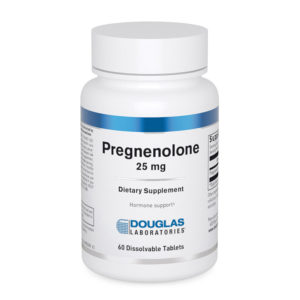
This supplement provides hormone support by aiding in the production of other hormones including progesterone, DHEA, and estrogen. It is available in low doses of 5 mg or 25 mg.
EstroQuench
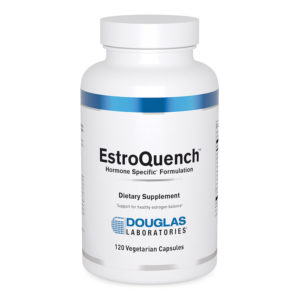
This supplement uses a hormone-specific formula that has aromatase-modulating potential as well as adaptogenic activity to help maintain healthy metabolism of estrogens.
Chaste Tree
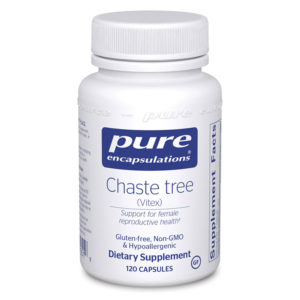
This extract from Chaste Tree berries helps women maintain a healthy menstrual cycle duration and flow, as well as reproductive function and breast comfort.
Chaste Tree contains flavonoids, iridoid glycosides, diterpenes, sesquiterpenes, an essential oil and other compounds.
Supplements and Vitamins Made Especially for Women Support Overall Health and Wellness
Women’s health needs are unique and the right supplements and vitamins will fluctuate with age and lifestyle choices. Deficiencies and disease can also have a negative impact on a woman’s overall health, especially when pregnant or entering menopause. The right supplements can provide the boost of vitamins necessary to promote overall health. The health needs of women are unique, no matter what stage of life you are in. Supplements can provide the best solution to living a healthy, well-balanced lifestyle.

